While more people are doing bowel cancer screening, the majority still throw away the kit when it arrives in the mail, research shows.
Figures from the Australian Institute of Health and Welfare for July 2013 to June 2014 showed only 36 per cent of the 1.4 million people sent bowel cancer screening tests sent the kit back for analysis.
It was a slight improvement on the previous year’s participation rate of 33.4 per cent.
But it was well below participation rates for other cancers such as breast and cervical cancer.
More than 500,000 people participated in the program, with 38,000 people having abnormalities that warranted further tests.
The study found women were more likely to do the screening test but men had higher rates of bowel cancer.
It also revealed that Aboriginal and Torres Strait Islander people completed fewer kits, had higher rates of positive screening results and lower rates of colonoscopies.
Screening works, say cancer advocates
Bowel Cancer Australia chief executive Julian Wiggins said all Australians from age 50 who did not have symptoms or a family history of bowel cancer should undertake bowel cancer screening every one to two years using a faecal immunochemical test (FIT).
That is the same kind of kit sent out by the Government.
Cancer experts say most cases of bowel cancer can be successfully treated if caught early.
“Screening using a faecal immunochemical test is one of the most effective ways to reduce the risk of bowel cancer as it can help detect pre-cancerous polyps for removal during colonoscopy or cancer in its earliest stages when it is easier to treat and cure,” Mr Wiggins said.
Since the national bowel cancer screening program began in 2006, it has detected more than 4,000 cancers and more than 12,000 potential tumours.
Many cases of bowel cancer can be prevented by a diet high in fibre, regular exercise, reducing meat and alcohol intake, obesity and smoking.
Rotary Australia also runs a bowel cancer screening campaign where testing kits can be purchased at pharmacies.

